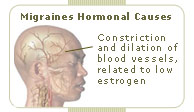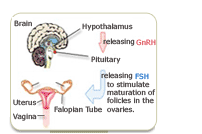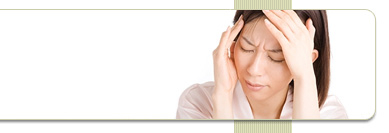34 MENOPAUSE SYMPTOMS |
HEALTH CENTER |
|
| |
|
|
|
|
|
|
Migraines & Headaches causes |
|
|
|
|
|
|
Migraine headaches can be triggered by a variety of factors. Given that women most often experience migraines during the menstrual cycle, pregnancy, and menopause, fluctuations in hormonal levels are clearly implicated in the incidence of headaches. Keep reading to learn how declining estrogen levels can trigger migraines during menopause, as well as the other most common triggers of migraine headaches. |
|
|
Scientists believe that migraine headaches involve the constriction and inflammation of blood vessels in the brain. Hormonal fluctuations most likely trigger migraines due to the ability of estrogen hormones to dilate blood vessels, and that of progesterone to constrict. When there are sudden drops in estrogen, like during menopause, blood vessels may constrict, making women more likely to suffer from migraine headaches.
|
 |
|
Paradoxically, elevated levels of estrogen in relation to progesterone also seem to trigger migraines. Women receiving higher doses of estrogen from oral contraceptives or hormone replacement therapy, for instance, are also at a greater risk for migraine headaches. Clearly, hormones play a complex role in migraine headaches that is not yet fully understood. |
|
25% of women suffer from migraines and headaches.
|
|
If a woman has a predisposition towards migraines, because of family history and/or menopause-related hormonal changes, several other external factors can act to trigger migraine headaches. |
|
|
- Overconsumption of alcohol, caffeine, or monosodium glutamate (a common seasoning in Asian food)
- Fasting/skipping meals
- Stress
- Inadequate sleep
- Bright light or strong smells (such as gasoline, cigarette smoke)
|
|
Migraine headaches are an often incapacitating problem that can negatively affect all areas of a woman's life, but it's important to know that migraines often are preventable and treatable. Keep reading to get all the facts about the best ways to fight back against migraine headaches.  |
|
| |
|

|
|
Acupuncture proven to alleviate migraines |
|
A study in the British Medical Journal says that acupuncture can effectively relieve migraine headaches. Acupuncture is an ancient, traditional Chinese form of medicine that involves the insertion of fine needles into the skin at strategic points on the body. |
|
|
| |
| |
| |
|
|
|
Migraine headaches may feel relentless, but there are different treatment options that can bring relief. Keep reading the section below to learn about the most effective treatments for menopause-related migraine headaches, including lifestyle changes, alternative treatments, and medical procedures. |
|
|
|
|
|
Treatment for Migraines & Headaches
with MacaActive Supplements |
|
As you have already read, migraine headaches are mainly caused by declining estrogen levels, which is a natural part of aging. Therefore, if you want relief from this undesirable symptom, you must restore estrogen hormone levels.
Today there are three effective ways to normalize hormonal levels: lifestyle changes, alternative medicine and drugs & surgery.
|
|
|
 |
Lifestyle Changes: This level of treatment involves no risk, but may be the hardest way to go because you'll have to restrict yourself from many things. That's why most people consider the next level of treatment, alternative medicine, which has proven to be excellent for treating migraine headaches in a safe and natural way.
|
|
|
 |
Alternative medicine: There are two types of herbal supplements for treating migraine headaches: Those containing phytoestrogenic herbs, and those containing non-estrogenic herbs. Phytoestrogenic herbs (like Black Cohosh) are filled with phytoestrogens, which are similar to estrogens. They can increase low estrogen levels by replacing some of the missing estrogen hormones. This isn't the best solution, however, because your body will become less responsive to producing estrogen on its own, causing a further decrease in body-own hormone levels. Unlike phytoestrogenic herbs, non-estrogenic herbs don't contain estrogen, but nourish hormonal glands to work more efficiently. This ultimately results in balancing not only estrogen, but other necessary hormones, as well. Non-estrogenic herbs are thus one of the best and safest ways to treat migraine headaches naturally.
An excellent example of a safe and effective non-estrogenic herb for hormonal imbalance is herbal MacaActive. What makes MacaActive so special is its ability to balance hormonal levels in women by nourishing the hormonal glands. It thus alleviates most disorders related to hormonal imbalance, including migraine headaches.  to read more about MacaActive.
|
|
|
 |
Drugs and Surgery: This level of treatment has the highest risk and often the highest costs. The most common drug therapy for treating migraine headaches in the US is hormone replacement therapy (HRT). There's no doubt that this is the quickest and strongest way to combat hormonal imbalance. Unfortunately, it entails serious side effects and increases the risk of different types of cancer in women. If you still want to consider this approach, see your doctor to become better informed about what this treatment option involves.
|
|
|
A safe way for balancing hormones:
Non-estrogenic herbs are the most effective solution for treating hormonal imbalance and its related symptom, migraine headaches.
MacaActive is an excellent non-estrogenic herb. It's simple: rather than putting hormones from the outside into your body artificially, MacaActive stimulates your hormone glands into producing the necessary hormones naturally. This is what makes MacaActive supplements so unique.  to read all about MacaActive. |
 |
|
|
 |
|
|
|








